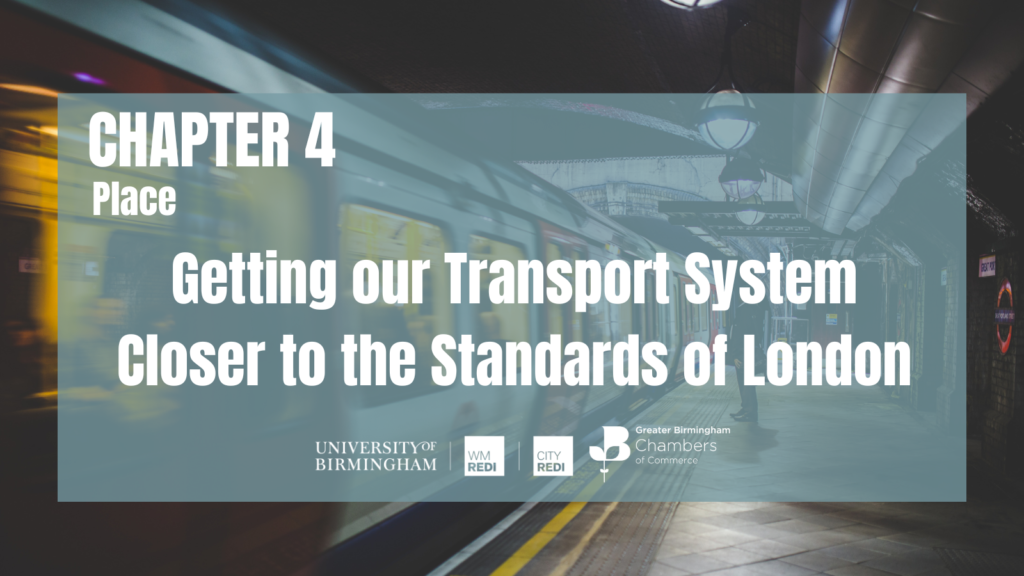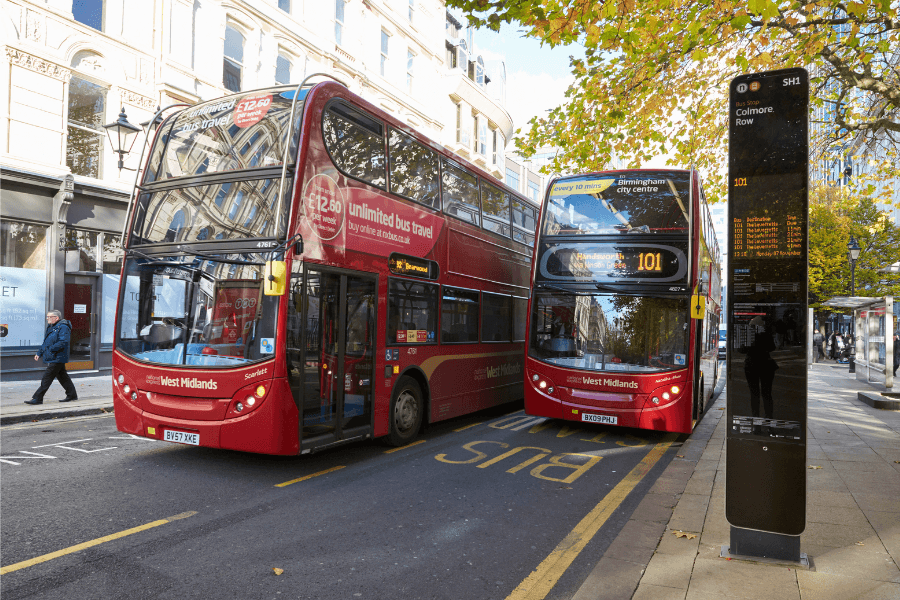
Adam Harrison, Principal Transport Policy and Strategy Officer, Transport for West Midlands discusses how we can make our transport systems in the region better and stronger for our communities.
This article was written for the Birmingham Economic Review 2023.
The review is produced by City-REDI/ WMREDI, the University of Birmingham and the Greater Birmingham Chambers of Commerce. It is an in-depth exploration of the economy of England’s second city and a high-quality resource for informing research, policy and investment decisions.
Challenges
After decades of underinvestment, our region is beginning to turn our transport system around.
Buses
But significant challenges still remain such as constrained accessibility for our residents and communities. Currently, 25% of households in the West Midlands don’t have access to a car and people from ethnic minority communities are 2x more likely to have no access to a car (Race Forward 2023). 1.3 million people living in the WMCA met area do not identify as being from a White British background.
The Pandemic
The impact of the pandemic and the cost-of-living impacts have had negative impacts on accessibility. Public transport operating costs have gone up whilst demand to travel has dropped, which has put levels of service at risk. Public transport usage remains below pre-pandemic levels. The bus industry, in particular, is facing acute challenges.
The West Midlands Combined Authority (WMCA) has set out a clear regional strategy for delivering inclusive economic growth, and improving people’s access to opportunities is a fundamental way of achieving the organisational vision. Improved accessibility enables businesses to reach customers more effectively, links employers to a wider pool of potential employees and encourages business development.
So delivering inclusive economic growth, rising to our post-pandemic challenges for public transport and ensuring those 25% of household are able to participate in our economy is critical for the continued success of the region.
What we’re doing to address the challenges
Working with partners in councils, universities and the private sector, Transport for West Midlands (TfWM) has made solid progress in strengthening our transport system – which has been boosted by two devolution deals with the national government. The devolution process has helped TfWM secure the City Region Sustainable Transport Settlement (CRSTS) £1bn capital investment programme up to 2027.

TfWM, alongside the national government, has provided additional funding to protect valued bus services for the Commonwealth Games and beyond. Our bus network has the highest percentage of network mileage protected of any large urban conurbation outside of London.
Long Term Commitments
These long-term commitments are helping the West Midlands create an integrated transport system based on the principles of London’s provision for high-density capital, as well as investing in high-quality cycle infrastructure and improved conditions for walking and wheeling. Since becoming the UK’s first Future Transport Zone four years ago, the West Midlands has rightly earned a reputation for creative thinking around the future of transport. TfWM is working with SMEs and businesses to develop and provide real-world testing of pioneering technology and exciting new ideas around the way we move.
A Deeper Devolution Deal agreed between the Combined Authority and Government in March 2023, builds on earlier deals to transfer further powers and funding streams from Whitehall to the West Midlands. This includes offering further autonomy for TfWM to establish itself as a leader in transport innovation in the UK and improve the transport offered to its citizens.
The recent deal gives the region a greater set of tools to face these challenges and create an integrated transport system that is fit for the future. In line with the new West Midlands Local Transport Plan (LTP), we will use the provisions of the deal to deliver a network with improved accessibility, reduced traffic and decarbonised public transport.
This blog was written by Adam Harrison, Principal Transport Policy and Strategy Officer, Transport for West Midlands.
Disclaimer:
The views expressed in this analysis post are those of the author and not necessarily those of City-REDI / WMREDI or the University of Birmingham.
